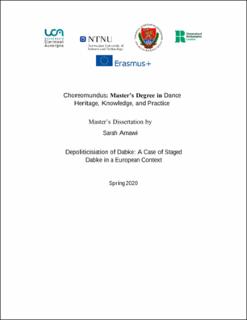Depoliticisiation of Dabke: A Case of Staged Dabke in a European Context
Master thesis
Permanent lenke
https://hdl.handle.net/11250/3127755Utgivelsesdato
2020Metadata
Vis full innførselSamlinger
- Institutt for musikk [473]
Sammendrag
Dabke is a social dance that has been transformed and implemented in political and national identification contexts in the post-colonial Levantine region, right after the British-French Sykes-Picot Agreement in 1916, in which the Levant region became separated into Jordan, Syria, Lebanon, and Palestine. Those post-mandate countries modified and utilised dabke in ways that it became a national pride emblem in each of those newly-formed countries.
This dissertation investigated and evaluated the strategies through which the Levantine dabke group, Watan, intended to take dabke dance out of its pre-established political and national contexts, and represent it in a neutral, modern, and globalized fashion, in Belgium. The unprecedented nature of this effort to depoliticise a dance like dabke inspire this research to enrich this field of academia; in which relatively few studies have been made on this dance in its modern context.
The methods used to conduct this research varied between participant-observation, observant-participation, interviews, and contextual analysis.
After investigating the elements and strategies the Watan Dabke Group practised in the quest of achieving an apolitical representation of dabke, an evaluation of their consistency took place. The outcome of this evaluation showed the complexity of depoliticising as a process, and revealed the paradoxes generated in the differences between the idea and its implementation. Those inconsistencies manifested through comparing the ideologies this group promotes and the actions through which they execute them.
